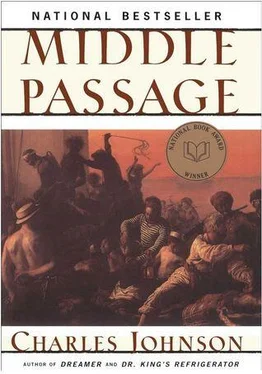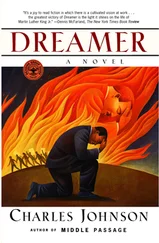“He took mebbe fifteen minutes. After that he called me in and give me his knife. Cringle closed me fingers round the handle. He instructed me that if I preferred not to kill him face to face, he’d turn his back to me. Don’t you know he told me to cover his mouth, plunge the knife between his shoulder blades, then pull it free and cut his throat from behind. If that was too difficult for me, he said I should stab into the soft flesh behind his ear, pokin’ straight through the brain. If not that method, then I was to grip the blade with both hands and strike just below his collarbone, workin’ the knife back and forth so it wouldn’t break when I withdrew it. He told me we was down to only four or five knives, so I couldn’t afford to have this one snap off inside him when his body pitched forward.
“At first I couldn’t do it, Illinois. I started to ask if it wouldn’t be better fer us to die like men, but I checked meself before sayin’ a thing so foolish, ’cause what could I mean? What was the limit of bein’ human? How much could yuh take away and still be a man? In a kind of daze I done what he wanted, standin’ back from meself, then unstringin’ him, and it was in a daze that I lay back, short-winded and watchin’ the Africans cut away Cringle’s head, hands, feet, and bowels, and throw ’em overboard. Next, they quartered him. They skinned him and cut the meat into spareribs, fatback, bacon, and ham. It was then I reckon it hit me, that I’d killed a man.” Squibb’s eyes darted toward the cabin door, as if the mate’s ghost might be standing there. “I can’t sink no lower, laddie, and I ’spect Mr. Cringle’s won his wings. After what he done, I don’t plan to lose yuh. Yuh kin count on that. . ”
Cringle’s death silenced me. By any measure, he had been the best mate among us, the most magnanimous and gentle during our ordeal, the most generous in the face of hopelessness — in fact, a sailor who gave hope, steadied the ladder for others, and solved more problems than he created. I could not long straddle the thought that Providence had taken him so brutally. I wanted Squibb to deny it, but as I watched him work I saw, as he could not, how thoroughly his own life had been altered by our voyage. As our mates perished, Squibb was pressed into service not only as the ship’s cook but also as our surgeon, and was often obliged to search his rum-pickled memory for nautical knowledge when a helmsman was needed. More than anyone, I think I knew how these demands and duties, all in the face of probable death, tested him. Now, what I am about to say must go no farther than the pages of this logbook. Five or maybe six days after the mutiny Cringle caught Josiah Squibb stealing rations reserved for the children. He was that hungry. That afraid. When the mate called him on the carpet he cried. His parrot too. It behooves me to explain how great a crime this, more than murder and man-eating, seemed to him. Until those days of sin, the darkest for him in the calendar of our cruise, he had believed the Almighty would safely deliver us to shore. But no longer. Distinctly, I remembered the Old Man saying, “A ship is a society, if you get my drift. A commonwealth, Mr. Calhoun,” and Squibb, after snatching food from the mouths of infants, felt too ashamed to speak to me or anyone for a few days after Cringle caught him stealing. What was the use? Every day since leaving the fort we had lost something. Now there was nothing more to lose. Being that far down he was no longer afraid to fall. In this new condition, the concepts of good and evil, sinner and saved, even of life and death, falsified the only question of significance aboard ship, which was this: What must he do next? If asked to double-breech the lower decks or batten hatchways, he quietly did so, lifting himself above likes and dislikes, dwelling on the smallest details of his chores to deflect his mind from brooding — a Way, perhaps, to solder that deep schism Falcon believed bifurcated Mind. When someone had to fit a strap around the main topmasthead, it was Squibb who swung the block, a coil of halyards, and a marlinespike round his neck and, oblivious to the ship’s swinging hard to starboard, to the fact that he had a bad foot and might fall from the crosstrees, climbed aloft and finished the job in Bristol fashion. Whatever was needful he did, including the learning of a little conversational Allmuseri when Diamelo demanded his former captors ease back from English. It would have been helpful to know if he still sought perfection in women who looked like his late wife. . Don’t care about that? Okay, we shall push on. .
The result of Squibb’s sea change was that his touch, as he worked the lancet, reminded me of Ngonyama’s (or that of a thief), as if he could anticipate my pain before I felt it, and therefore move the other way. His breathing even resembled that of the Allmuseri, the proportion of inhalation, retention, and exhalation being something like 1:4:2, like oil slowly flowing from one vessel to another. I felt perfectly balanced crosscurrents of culture in him, each a pool of possibilities from which he was unconsciously drawing, moment by moment, to solve whatever problem was at hand.
“Josiah, that ship. .”
“Ah was the one signaled her. I cried, ‘Ho there, the ship, ahoy,’ then Diamelo stopped me with a cat. He’s afraid she’s a man-o’-war that’ll put the blacks back in irons. Things are bad. I have to tell yuh that. Ngonyama can’t help us now. He’s pissin’ blood, bleedin’ inside, I figure, so I don’t give him much time. I don’t give any of us much time. We’re comin’ into dirty weather again. The ship won’t wear. This boat’s mebbe our only chance to get home. Diamelo wants to fire on her, then abandon this tub — and us — fer that one. Y’know, I’d say that boy’s a li’l slack in the stays. .”
“No question, but has he convinced the others to become corsairs too?”
The cook sighed. The lines of his face were all vertical, those on his forehead flat, like currents. “Can’t say. It’s all touch ’n’ go from heah, Illinois.”
“Josiah—”
Squibb shushed me. The telling of this left him looking squally and shivering so badly, like a man lost in snow, that he took himself duckfooting from the room, splashing through water, after removing the tourniquet from my arm, and I cannot say I heard him rightly through the natter and babble of voices in my head. More weakened than before from bleeding — he had drawn a pint of purplish blood — I could only rest quietly, thinking of the ship that might be our savior, my heart whamming away like a drum as our own boat convulsed.
I slept. Deeply at first, then in pools of my own milky perspiration. Slept through the passing of light and patches of darkness in the portal above my head, and came awake into a conscious nightmare. Never ill a day in my life, thanks to Master Chandler’s Saturday morning doses of castor oil, I now found that my gums were bleeding. I could not stop the flow. Rags of bedclothing stained with blood began to pile up beneath the berth where I lay. Crisp pain coursed through all parts of my body — stomach, head — and I would have felt pain in my spleen and pancreas too, but I wasn’t exactly sure where they were. There came a knock at my door. Twice, I think, but I was unable to answer. The catch was turned. The door eased open. Someone looked in, saying nothing, then passed on. In the cavity of my chest a fire burned like camphor. I lay sprawled in purging fever. A quivering mass of jelly. My eyes felt filmy, and so I tried to keep them closed, sleeping again and shivering violently, though, as I say, I felt that I was on fire.
When I opened my eyes again — I do not know the day — the cabin had a twisted feel, the surface of objects warped, the planes and lines of the room falling away to a point in the corner millions of leagues away. I closed my eyes, only to experience a vertigo like the vortices that suck ships to the bottom of the briny. Slowly I pulled myself to the floor, feeling nothing under my feet, though I knew well enough I must be standing, feeling, in fact, no physical tie to the other objects in the room at all. Then I gave at the knees and keeled over.
Читать дальше












